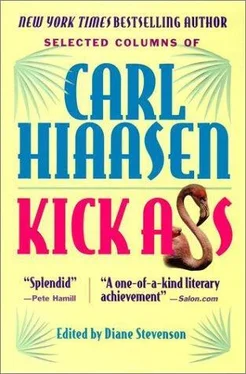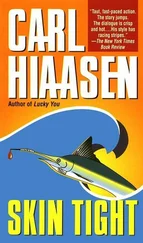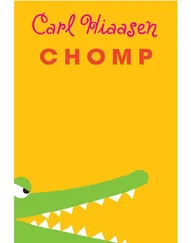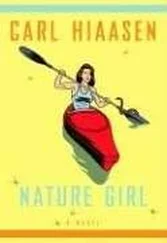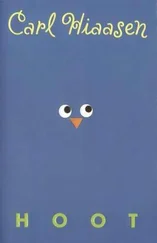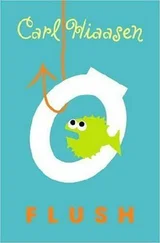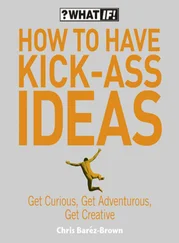Hiaasen traces his strong sense of right and wrong back to the losses of the 1960s—the "complete end of innocence" caused by the Kennedy assassinations, two tragic events creating the historical circumstances that placed Richard Nixon in the White House, accelerated the war in Vietnam, and ultimately led to Watergate. "It was a poisonous time to be coming of age," Hiaasen says. "It seemed to me there was so much wrong in the world. I felt such outrage for so many years over those things happening that it wasn't a hard thing to carry into journalism."
When Hiaasen began his Miami Herald column in 1985, however, after having first been a general assignment reporter and then a member of the Herald's prize-winning investigation team, the newspaper hadn't yet established a tradition of commentary written with "ferocity and passion, mordant wit, and moral outrage," as Doug Clifton, former executive editor of the Miami Herald, describes Hiaasen's bi-weekly column. Miami was still a young city, Hiaasen explains, with no voice, even on the editorial page, that expressed strongly held opinions likely to inspire an equally strong response from readers. So when Hiaasen ridiculed the first Cuban American county manager, whose indictment for grand theft was dismissed because of a 1951 ruling on cattle rustling ("a standard of conduct against which all public officials should be tested," Hiaasen dryly observed), Herald editors initially cringed. Interestingly, however, the following year that same county manager forgot to disclose, as required by law, a large profit he made on a land deal, prompting Hiaasen to write that such memory lapses by someone controlling the county budget suggested the need for a brain scan in addition to a lawyer: "If I thought [he] deserved to be fired for lying to the IRS and buying stolen suits and lying about it, I would say that in the column. Gotta get rid of the guy. And it was unheard of at the time."
From the start, it was also clear Hiaasen would not allow himself to be bullied. In 1987, when a city commissioner objected to funding the Sister Cities convention because representatives from communist countries might attend, Hiaasen called his antics "boneheaded." By certified mail, the commission sent a formal, albeit unintelligible, resolution demanding that the Herald retract or clarify Hiaasen's "false and misleading statement," to which Hiaasen replied that since his original column was neither false nor misleading, he couldn't add even "a cheerfully instructive footnote." He did, however, formulate a resolution of his own, which reads, in part:
"Be it resolved: It is hereby demanded that the Miami City Commission quit wasting time on dumb, self-serving resolutions when there are so many more important issues facing the community.
"Regarding the Sister Cities International convention and the alleged Communist menace therein, it is hereby demanded that city commissioners halt such reactionary nonsense immediately, since it exposes all South Florida to national scorn and ridicule. It is further demanded that if the commissioners choose to make fools of themselves, that they do so in the privacy of their homes and not in a public forum."
Now, much of Miami has come to expect a no-holds-barred Hiaasen column that synthesizes news stories and corruption scandals, and makes sense of issues in its own "brilliant fashion, with humor that skewers," according to Jim Savage, head of the Herald's investigations team, who worked with Hiaasen in the mid-1980s on uncovering and ultimately stopping Port Bougainville, one of several illegally sited developments that would have added altogether some 60,000 people to North Key Largo. On this project, and on the Smuggler's Island investigation, which began with a memo about a water main and ended with a series on dope running in Key West, Savage observed firsthand Hiaasen's legendary insight. It was Hiaasen, Savage notes, who quickly recognized the heart of the story—how drug dealing dramatically altered people's lives, especially in Key West, but with implications for the rest of the country. Savage now uses Hiaasen's story-assembling techniques, as well as his accuracy, fairness, and skillful interviewing, as a model of excellence in investigative reporting when he teaches seminars in project writing. "Carl is the most talented journalist I've worked with because he's an outstanding researcher and a world-class writer," Savage says. "It would be great if we could clone Carl Hiaasen, so one could still be working with me."
At age four, Carl Hiaasen learned to read using the Miami Herald sports page and maps of Florida. Two years later, when he got his first typewriter as a present from his father, he taught himself to hunt and peck well enough to write his own sports page, reporting on neighborhood kickball and softball games in newsletters he handed out to friends. Even then, he knew he wanted to be a journalist, because getting paid to learn about the world and report on it in stories bearing his name seemed the perfect occupation.
Continuing to write for pleasure in high school, Hiaasen again had his own publication, More Trash, an underground newsletter in which he experimented with irreverent commentary by poking fun at the traditions of mainstream adolescent culture, as well as satirizing the teachers and administrators of Plantation High. At Emory University, he ghostwrote a doctor's memoirs, and within the next two years, had married his high school sweetheart, Connie, become a father, and moved to Gainesville to major in journalism at the University of Florida.
When he graduated in 1974, having just turned twenty-one, Hiaasen was hired by Cocoa Today as a general assignment reporter, and soon after became a feature writer for their Sunday magazine, Sunrise. Two years later, in 1976, he was invited to join the Herald's Broward Bureau, where he remained for about six months before being moved to the newspaper's city desk in Miami as a general assignment reporter. He quickly became a feature writer for the Herald's Sunday magazine, Tropic, and in 1979 joined two-time Pulitzer prize winner Gene Miller, associate editor for reporting, in investigating and writing "Dangerous Doctors," an eight-part series remembered today for its excellence and impact.
During the early 1980s, while still a member of the investigations team, Hiaasen began to write fiction, spending evenings and weekends co-authoring, with the late William Montalbano, three novels—the recently reprinted Powder Burn , Trap Line , and A Death in China . In 1985—as he was about halfway through his first solo novel, Tourist Season , one of seven ( Double Whammy , Skin Tight , Native Tongue , Strip Tease , Stormy Weather , and Lucky You ) that established his national reputation as one of America's best satirists—the Herald asked Hiaasen if he wanted to write a column.
Those at the Herald who knew him during these early years say that even in his twenties Hiaasen was clearly one of a kind, his gifts being distinctly extraordinary. Doug Clifton remembers Hiaasen as "a young man with talents that far surpassed those that you would expect from someone of that age and experience." Immediately evident, Clifton says, were Hiaasen's wit, probing mind, remarkable energy and the "incredible ability to handle himself in tough situations, to write with clarity, and to peer into things and catch their essence."
Since working as an investigative reporter with Jim Savage and Gene Miller, Hiaasen has written some 1,300 columns. A very few recount personal anecdotes—about bonefishing, or blowing up frogs as a child, or trying to find his young son's lost snake, Lefty. Others tackle national issues and political candidates or officeholders. Most columns, however, focus on the overdevelopment of crowded South Florida, its immigration inequities, gun- and drug-related violence, its image and scandals and tourists, and its misuse of taxpayers' money by venal or inept public servants.
Читать дальше
